Popular Austrian folk actress Lucie Englisch (1902-1965) played both leading and supporting roles on stage, in films, and on television. As the native girl with a loose tongue, she was seen in countless comedies, in both leading and supporting parts.
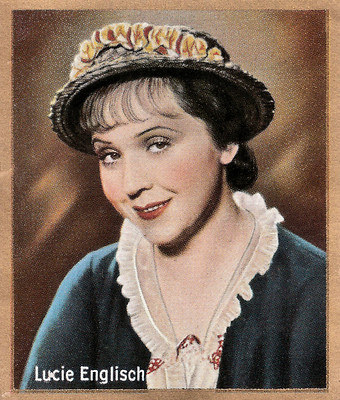
German collector card in the Unsere Bunten Filmbilder series by Cigarettenfabrik Salem, Dresden, no. 221 (of 275). Photo: Albö-Film.
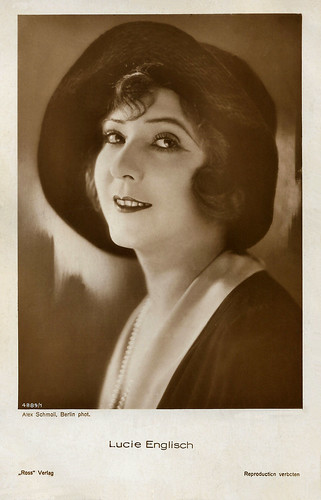
German postcard by Ross Verlag, no. 4889/1, 1929-1930. Photo: Alex Schmoll, Berlin.
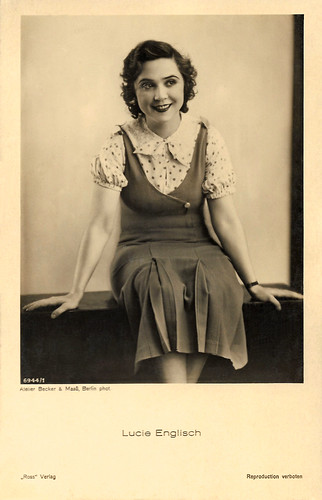
German postcard by Ross Verlag, no. 6944/1, 1931-1932. Photo: Becker & Maass, Berlin.
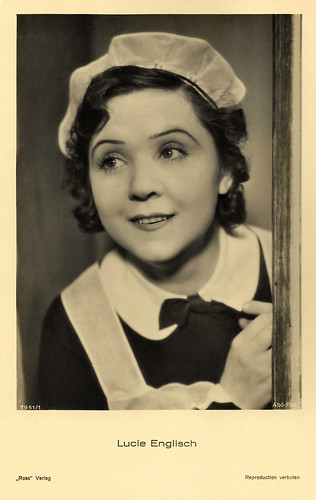
German postcard by Ross Verlag, no. 7951/1, 1932-1933. Photo: Albö-Film. Lucie Englisch in Die kalte Mamsell / The Sandwich Girl (Carl Boese, 1933).
Lucie Englisch was born as Aloisia Paula Englisch in 1902 in Leesdorf, Austria. She was the daughter of merchant Ernst Englisch and his wife Theresia, born Huemer.
Already as a schoolgirl, she worked as an extra at the Stadttheater of Baden near Wien, Vienna. In 1923, she made her stage debut at the Kurtheater in Baden. Engagements at the stages of Vienna followed.
From 1926 to 1928, she worked at the Neuen Theater in Frankfurt am Main. Since 1928, she has worked in theatres in Berlin. She made her film debut in Die Nacht gehört uns / Night Is Ours (Carl Froelich, 1929) with Hans Albers. It marked the starting shot of a great film career.
In the following decades, Lucie Englisch appeared in more than 130 film roles. The 1930s were a very busy decade which she normally played naive employees in support roles. Her well-known films of the era include Drei Tage Mittelarrest / Three Days in the Guardhouse (Carl Boese, 1930), Dienst ist Dienst/Duty Is Duty (Carl Boese, 1931), Die Gräfin von Monte Christo / The Countess of Monte Cristo (Karl Hartl, 1932) with Brigitte Helm, Meine Frau, die Schützenkönigin / My Wife the Champion Shot (Carl Boese, 1934), and Der lachende Dritte / The Laughing Third Party (Georg Zoch, 1936).
During the war the role offers were scarce but she did appear in productions like Der ungetreue Eckehart / Unfaithful Eckehart (Hubert Marischka, 1940) starring Hans Moser, So ein Früchtchen / What A Sweetie (Alfred Stöger, 1942) with Paul Hörbiger, and Fahrt ins Abenteuer / Trip Into Adventure (Jürgen von Alten, 1943).

German postcard by Ross Verlag. Published for Das Programm von Heute für Film und Theater G.m.b.H, Berlin. Photo: Vogelsang, Berlin.

German postcard by Ross Verlag. Published for Das Programm von Heute für Film und Theater G.m.b.H, Berlin. Photo: Becker & Maass, Berlin.

German postcard by Ross Verlag, no. 723, 1925-1926. Photo: Becker & Maass, Berlin.
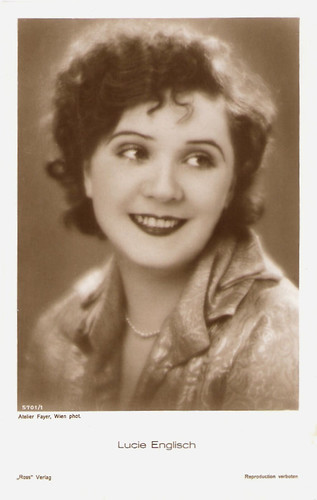
German postcard by Ross Verlag, no. 5701/1, 1930-1931. Photo: Atelier Fayer, Wien.

German postcard by Ross Verlag, no. 6051/1, 1931-1932. Photo: Albo-Film.
Lucie Englisch often appeared in comedies, both in leading and supporting roles. Before the war, she had starred in comedies like Um eine Nasenlänge / By the Skin of His Teeth (Johannes Guter, 1931) with Siegfried Arno, and Pat und Patachon im Paradies / Long and Short in Paradise (Carl Lamac, 1937) opposite the Danish comedy team Fy og Bi (aka Long & Short).
The post-war film offered Lucie Englisch a lot of work again, but her roles were reduced to two-dimensional figures, and the quality of the films left much to be desired. Shallow comedies and Heimatfilms became her new field of activity.
To her comedies belong Der Theodor im Fussballtor / Theodore the Goalkeeper (E. W. Emo, 1950) with Theo Lingen and Hans Moser, Tante Jutta aus Kalkutta (Karl Georg Külb, 1953) with Ida Wüst, Seine Tochter ist der Peter / His Daughter Is Peter (Gustav Fröhlich, 1955), and Der letzte Fußgänger / The Last Pedestrian (Wilhelm Thiele, 1960) with Heinz Erhardt.
She also appeared in the vehicles for the Bavarian comedians Joe Stöckel and Beppo Brem, Wildwest in Oberbayern (Ferdinand Dörfler, 1951), Zwei Bayern in St. Pauli / Two Bavarians in St. Pauli (Hermann Kugelstadt, 1956), and Zwei Bayern im Urwald / Two Bavarians in the Jungle (Ludwig Bender, 1957).
Her Heimatfilms include Schwarzwaldmädel / The Black Forest Girl (Hans Deppe, 1950) with Sonja Ziemann, and Hubertusjagd (Hermann Kugelstadt, 1959) with Willy Fritsch. In the 1960s, she moved over to television. Lucie Englisch died in 1965 in Erlangen, Germany, of liver disease. She was married to director Heinrich Fuchs (1896-1961) and had a son, Peter Fuchs (1933).

German postcard by Ross Verlag, no. A 2233/1, 1939-1940. Photo: Sandau, Berlin.

German postcard by Ross Verlag, no. A 2730/1, 1939-1940. Photo: Sandau, Berlin.
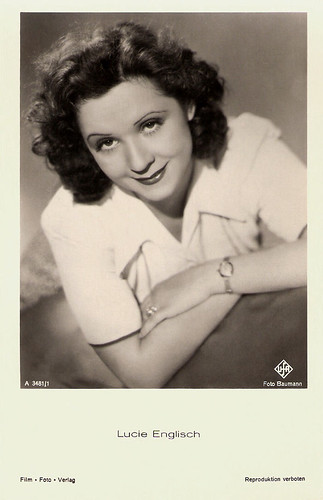
German postcard by Film-Foto-Verlag, no. A 3481/1, 1941-1944. Photo: Baumann / Ufa.

German postcard by Film-Foto-Verlag, no. A 3801/1, 1941-1944. Photo: Binz / Berlin-Film.

German postcard by Kunst und Bild, Berlin W, no A 726. Photo: Schönbrun-Film / Constantin-Film. Lucie Englisch in Die Fiakermilli (Arthur Maria Rabenalt, 1953).
Sources: Thomas Staedeli (Cyranos), Wikipedia, and IMDb.
This post was last updated on 25 August 2025.

German collector card in the Unsere Bunten Filmbilder series by Cigarettenfabrik Salem, Dresden, no. 221 (of 275). Photo: Albö-Film.

German postcard by Ross Verlag, no. 4889/1, 1929-1930. Photo: Alex Schmoll, Berlin.

German postcard by Ross Verlag, no. 6944/1, 1931-1932. Photo: Becker & Maass, Berlin.

German postcard by Ross Verlag, no. 7951/1, 1932-1933. Photo: Albö-Film. Lucie Englisch in Die kalte Mamsell / The Sandwich Girl (Carl Boese, 1933).
The starting shot of a great film career
Lucie Englisch was born as Aloisia Paula Englisch in 1902 in Leesdorf, Austria. She was the daughter of merchant Ernst Englisch and his wife Theresia, born Huemer.
Already as a schoolgirl, she worked as an extra at the Stadttheater of Baden near Wien, Vienna. In 1923, she made her stage debut at the Kurtheater in Baden. Engagements at the stages of Vienna followed.
From 1926 to 1928, she worked at the Neuen Theater in Frankfurt am Main. Since 1928, she has worked in theatres in Berlin. She made her film debut in Die Nacht gehört uns / Night Is Ours (Carl Froelich, 1929) with Hans Albers. It marked the starting shot of a great film career.
In the following decades, Lucie Englisch appeared in more than 130 film roles. The 1930s were a very busy decade which she normally played naive employees in support roles. Her well-known films of the era include Drei Tage Mittelarrest / Three Days in the Guardhouse (Carl Boese, 1930), Dienst ist Dienst/Duty Is Duty (Carl Boese, 1931), Die Gräfin von Monte Christo / The Countess of Monte Cristo (Karl Hartl, 1932) with Brigitte Helm, Meine Frau, die Schützenkönigin / My Wife the Champion Shot (Carl Boese, 1934), and Der lachende Dritte / The Laughing Third Party (Georg Zoch, 1936).
During the war the role offers were scarce but she did appear in productions like Der ungetreue Eckehart / Unfaithful Eckehart (Hubert Marischka, 1940) starring Hans Moser, So ein Früchtchen / What A Sweetie (Alfred Stöger, 1942) with Paul Hörbiger, and Fahrt ins Abenteuer / Trip Into Adventure (Jürgen von Alten, 1943).

German postcard by Ross Verlag. Published for Das Programm von Heute für Film und Theater G.m.b.H, Berlin. Photo: Vogelsang, Berlin.

German postcard by Ross Verlag. Published for Das Programm von Heute für Film und Theater G.m.b.H, Berlin. Photo: Becker & Maass, Berlin.

German postcard by Ross Verlag, no. 723, 1925-1926. Photo: Becker & Maass, Berlin.

German postcard by Ross Verlag, no. 5701/1, 1930-1931. Photo: Atelier Fayer, Wien.

German postcard by Ross Verlag, no. 6051/1, 1931-1932. Photo: Albo-Film.
Shallow comedies and Heimatfilms
Lucie Englisch often appeared in comedies, both in leading and supporting roles. Before the war, she had starred in comedies like Um eine Nasenlänge / By the Skin of His Teeth (Johannes Guter, 1931) with Siegfried Arno, and Pat und Patachon im Paradies / Long and Short in Paradise (Carl Lamac, 1937) opposite the Danish comedy team Fy og Bi (aka Long & Short).
The post-war film offered Lucie Englisch a lot of work again, but her roles were reduced to two-dimensional figures, and the quality of the films left much to be desired. Shallow comedies and Heimatfilms became her new field of activity.
To her comedies belong Der Theodor im Fussballtor / Theodore the Goalkeeper (E. W. Emo, 1950) with Theo Lingen and Hans Moser, Tante Jutta aus Kalkutta (Karl Georg Külb, 1953) with Ida Wüst, Seine Tochter ist der Peter / His Daughter Is Peter (Gustav Fröhlich, 1955), and Der letzte Fußgänger / The Last Pedestrian (Wilhelm Thiele, 1960) with Heinz Erhardt.
She also appeared in the vehicles for the Bavarian comedians Joe Stöckel and Beppo Brem, Wildwest in Oberbayern (Ferdinand Dörfler, 1951), Zwei Bayern in St. Pauli / Two Bavarians in St. Pauli (Hermann Kugelstadt, 1956), and Zwei Bayern im Urwald / Two Bavarians in the Jungle (Ludwig Bender, 1957).
Her Heimatfilms include Schwarzwaldmädel / The Black Forest Girl (Hans Deppe, 1950) with Sonja Ziemann, and Hubertusjagd (Hermann Kugelstadt, 1959) with Willy Fritsch. In the 1960s, she moved over to television. Lucie Englisch died in 1965 in Erlangen, Germany, of liver disease. She was married to director Heinrich Fuchs (1896-1961) and had a son, Peter Fuchs (1933).

German postcard by Ross Verlag, no. A 2233/1, 1939-1940. Photo: Sandau, Berlin.

German postcard by Ross Verlag, no. A 2730/1, 1939-1940. Photo: Sandau, Berlin.

German postcard by Film-Foto-Verlag, no. A 3481/1, 1941-1944. Photo: Baumann / Ufa.

German postcard by Film-Foto-Verlag, no. A 3801/1, 1941-1944. Photo: Binz / Berlin-Film.

German postcard by Kunst und Bild, Berlin W, no A 726. Photo: Schönbrun-Film / Constantin-Film. Lucie Englisch in Die Fiakermilli (Arthur Maria Rabenalt, 1953).
Sources: Thomas Staedeli (Cyranos), Wikipedia, and IMDb.
This post was last updated on 25 August 2025.
No comments:
Post a Comment